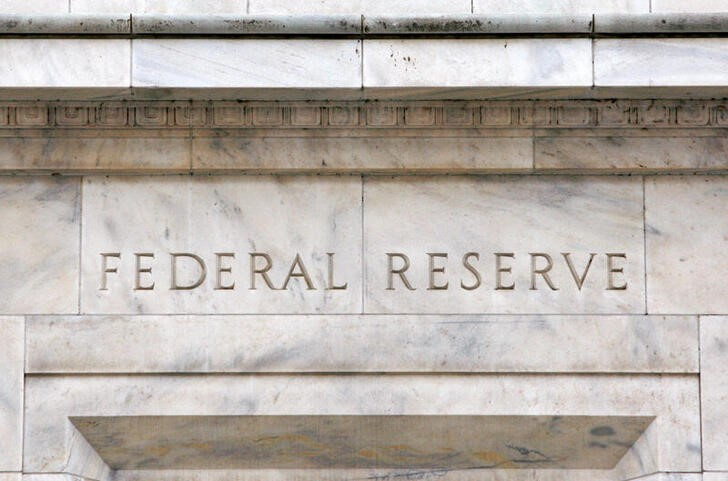Investing.com — Wall Street is seen trading slightly lower Tuesday ahead of the start of the last Federal Reserve policy meeting of the year. Nvidia shares have entered correction territory, while the German DAX could suffer as the country’s government was dissolved.
1. Fed to cut, but what happens in January?
The Federal Reserve starts its final policy meeting of the year later Tuesday, to be concluded on Wednesday with a widely-expected 25-basis point rate cut.
This reduction, which would be its third straight cut, has already been fully priced in, and thus the main focus is what the policymakers see in terms of further rate cuts in 2025.
Goldman now expects the central bank to stand pat in January against earlier expectations for a cut, explaining that unemployment has undershot and inflation has overshot the FOMC’s projections.
However, Standard Chartered (OTC:SCBFF) expects the Fed to follow up with another rate cut in January amid ongoing softness in the labor market.
“Our baseline forecast is that it cuts again on 29 January, because we expect the incoming labour market data to soften further,” the bank said, in a recent note.
“A higher unemployment rate or nonfarm payrolls growth of 125k or less should be enough [for the Fed to cut in January],” it added.
2. Futures slip lower; retail sales due
US stock futures slipped lower Tuesday, continuing the recent cautious trading ahead of the start of the final Fed meeting of the year.
By 04:05 ET (09:05 GMT), the Dow futures contract was down 120 points, or 0.3%, S&P 500 futures dropped 17 points, or 0.3%, and Nasdaq 100 futures fell by 57 points, or 0.3%.
The main Wall Street indices saw mixed trading on Monday, with the Nasdaq Composite gaining 1.2% and the S&P 500 up by around 0.4%, while the blue chip Dow Jones Industrial Average fell for an eighth consecutive day, for the first time since June 2018.
The economic data slate centers around retail sales data for November, which are expected to show growth of 0.6% on a monthly basis as consumers continued to spend.
3. Nvidia enters correction territory
Nvidia (NASDAQ:NVDA) has become the market favorite this year, with investors associating the chipmaker with the enthusiasm surrounding artificial intelligence as it became the biggest company in the world.
However, its stock fell into correction territory on Monday, falling 11% from its highest closing price after failing to break out of its recent slump.
This current weakness stems from concerns the company will become a punchbag given the escalating tech competition between the US and China.
Restrictions imposed by Washington prevent the company from selling its most advanced chips to Chinese firms, limiting their capacity to advance AI technologies.
China responded last week by launching an investigation into Nvidia over allegations of violating anti-monopoly regulations, as both governments seek influence over the dominant player in the AI chip market.
Nvidia has made several efforts to design AI chips that adhere to US export rules while still providing Chinese clients with tools to develop key technology.
It was forced to deny reports last week that it would cut supplies to China, saying China was an important market and it would continue to provide high-quality products and services to Chinese customers.
4. German political instability to weigh on DAX?
The German government was officially dissolved on Monday as Chancellor Olaf Scholz lost a vote of confidence, clearing the way for an early election on Feb. 23.
Scholz’s three-party coalition fell apart last month after the pro-market Free Democrats quit in a row over debt, leaving his Social Democrats and the Greens without a parliamentary majority.
This political turmoil has occurred during a period of economic instability, with the German economy, the eurozone’s largest, struggling to avoid a recession, while a trade war with a new Donald Trump-led administration looms.
Data released on Monday showed that German business activity contracted for a sixth month running this month, while German companies feel pessimistic about the new year, with only 12.6% expecting business conditions to improve in 2025, according to a poll by the Ifo institute.
Yet the German DAX index has climbed over 20% so far in 2024, substantially outperforming France’s CAC 40 index, with the eurozone’s second largest economy also struggling with political uncertainty.
“While equities in Germany have managed to ride out weak growth and political uncertainty this year, those in France have not. We suspect that they will all fare poorly next year, as those adverse conditions remain and a trade war takes a toll,” according to Capital Economics senior economist Hubert de Barochez.
5. Oil traders await Fed cues
Crude prices fell Tuesday, weighed by a bout of profit-taking ahead of the latest Federal Reserve policy meeting.
By 04:05 ET, the US crude futures (WTI) dropped 1.5% to $69.64 a barrel, while the Brent contract fell 0.8% to $73.31 a barrel.
Crude prices are falling from the multi-week highs seen last week, with Monday’s weak retail sales data out of China prompting profit-taking as investors fretted about the health of the second largest economy in the world.
Traders have also moved into a holding pattern ahead of the Fed’s meeting, reluctant to hold significant positions ahead of this potentially market-moving event.
The Fed is widely expected to cut interest rates by a quarter of a percentage point, a move that could boost economic growth and demand for oil.

